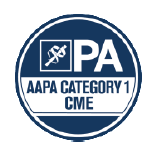
Substance Use Disorder Basics (for BORIM)
The series of lectures in this course cover a range of core topics in addiction medicine. These include screening, diagnosis, and treatment of substance use disorder; brief intervention for unhealthy substance use; treating alcohol and opioid use disorder; stigma; harm reduction; and unique issues in adolescence. These lectures will equip clinicians with a foundation of addiction medicine knowledge and will also count toward the Drug Enforcement Agency (DEA) requirement that all registrants complete eight hours of addiction medicine education and training.
Target Audience
This activity is intended for practitioners with a DEA registration to prescribe controlled substances (ie. any clinician with prescriptive authority - MD, DO, APRN, PA, CRNA, etc).
Learning Objectives
Upon completion of this activity, participants will be able to:
- Describe how to screen for and diagnose substance use disorder.
- Detail the components of effective addiction treatment.
- Define and give two examples of harm reduction.
Additional Information

Scott Hadland, MD, MPH, MS
Chief, Adolescent & Young Adult Medicine, Massachusetts General Hospital for Children
Associate Professor of Pediatrics, Harvard Medical School
Claudia Rodriguez, MD
Director of Outpatient Addiction Recovery Program, Brigham & Women's Hospital
Assistant Medical Director of Substance Use Disorders, Mass General Brigham
Instructor, Harvard Medical School
Sarah E. Wakeman, MD
Medical Director for Substance Use Disorder, Office of the Chief Medical Officer, Mass General Brigham
Associate Professor of Medicine, Harvard Medical School
In support of improving patient care, Mass General Brigham is jointly accredited by the Accreditation Council for Continuing Medical Education (ACCME), the Accreditation Council for Pharmacy Education (ACPE), and the American Nurses Credentialing Center (ANCC), to provide continuing education for the healthcare team.
Credit Designation Statements
AMA PRA Category 1 CreditTM
Mass General Brigham designates this live activity for a maximum of 6.00 AMA PRA Category 1 CreditTM. Physicians should claim only the credit commensurate with the extent of their participation in the activity.
Physician Assistants
Lifelong Learning Maintenance of Certification (MOC) Program
MOC RECOGNITION STATEMENT
Successful completion of this CME activity, which includes participation in the evaluation component, enables the learner to earn credit toward the CME requirement of the American Board of Surgery’s Continuous Certification program. It is the CME activity provider's responsibility to submit learner completion information to ACCME for the purpose of granting ABS credit.
Disclosure Summary of Relevant Financial Relationships
The following planners have reported no relevant financial relationship with an ineligible company:
Robert Birnbaum, MD, PhD
Scott Hadland, MD, MPH, MS
Claudia Rodriguez, MD
Sarah Wakeman, MD
The following speakers have reported no relevant financial relationships an ineligible company:
Scott Hadland, MD, MPH, MS
Claudia Rodriguez, MD
Sarah Wakeman, MD
Price
DEA MATE Act
In addition to the courses listed above, to fulfill your one-time, eight-hour training requirement for all Drug Enforcement Administration (DEA)-registered practitioners, please complete the following courses:
- Treating Pain in the Patient with Opioid Use Disorder (0.50 AMA PRA Category 1 CreditTM)
- Using Electronic Health Record Tools to Improve Care for Patients Prescribed Opioids or with Opioid Use Disorder (0.50 AMA PRA Category 1 CreditTM)
- The Role of Acute Care Prescribing in the Opioid Epidemic (1.00 AMA PRA Category 1 CreditTM)

 Facebook
Facebook X
X LinkedIn
LinkedIn Forward
Forward